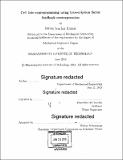Cell fate reprogramming using transcription factor feedback overexpression
Author(s)
Kumar, Nithin Senthur
DownloadFull printable version (5.241Mb)
Other Contributors
Massachusetts Institute of Technology. Department of Mechanical Engineering.
Advisor
Domitilla Del Vecchio.
Terms of use
Metadata
Show full item recordAbstract
Recent advances in stem cell research has demonstrated that the fate of a terminally differentiated cell can be reverted back to pluripotency. The ability to reprogram a differentiated cell back to its undifferentiated, pluripotent state would be a significant breakthrough for regenerative medicine. For example, lost or damaged cells could be replaced by patient-specific reprogrammed cells, thus providing on-demand, compatible, high-quality cells of any required type. However, current protocols for reprogramming rely on simplified models that do not wholly capture system dynamics and on inefficient transcription factor overexpression. We study a gene regulatory network that determines the cell fate in the hematopoietic lineage and demonstrate that a deterministic model cannot capture the experimentally observed system dynamics. We also propose the use of feedback control to address inefficient reprogramming and implement two configurations of the controller on both deterministic and stochastic models of the Oct4-Nanog network. We also address practical issues such as placement of the regulator and consider the effect of inducing or constitutively producing microRNA on the protein steady-state distribution.
Description
Thesis: M. Eng., Massachusetts Institute of Technology, Department of Mechanical Engineering, 2018. Cataloged from PDF version of thesis. Includes bibliographical references (pages 63-67).
Date issued
2018Department
Massachusetts Institute of Technology. Department of Mechanical EngineeringPublisher
Massachusetts Institute of Technology
Keywords
Mechanical Engineering.